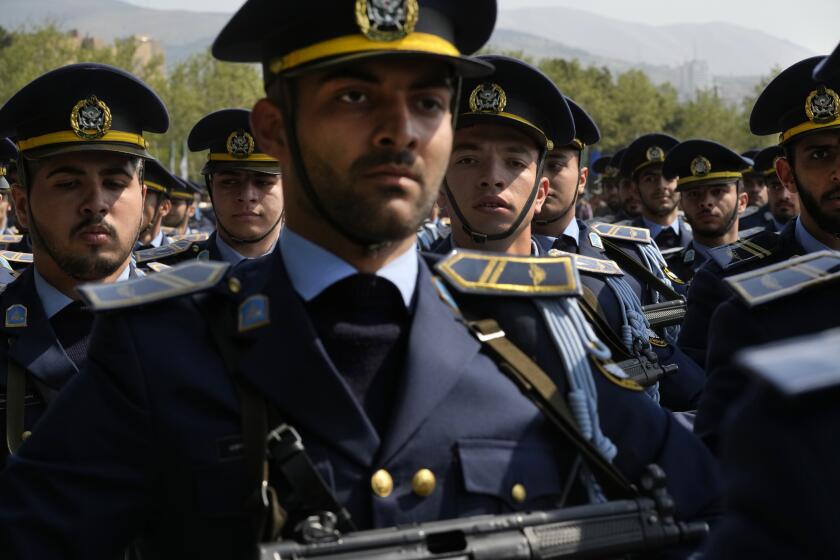2 Palestinian Terrorist Bands Draw Suspicion
U.S. intelligence and terrorism analysts, sifting through a jumble of circumstantial evidence on the possible cause of this week’s Pan Am crash, are increasingly focusing their suspicion on two extremist Palestinian groups that oppose Palestine Liberation Organization chief Yasser Arafat’s decision to recognize Israel.
The two groups, the Popular Front for the Liberation of Palestine-General Command and Abu Nidal’s Revolutionary Council of Fatah, were recently named in U.S. intelligence reports as posing an increased threat to American facilities abroad and have a history of using sophisticated explosives, officials said.
Pressure-Activated Bomb
A PFLP-GC leader arrested in West Germany in October was found to possess a bomb with a barometric pressure device that would trigger a detonator when an airplane reached a designated altitude, they said.
But officials cautioned that they have no direct evidence to link either of the two factions to the crash, which has still not officially been blamed on terrorism.
“What we’re dealing with is still an accident or incident,” L. Paul Bremer, the State Department’s chief counterterrorism officer, said in an interview. “We have no more indication than we did 24 hours ago that it was sabotage.”
Nevertheless, Bremer said, analysts are working to see whether the available evidence points to a specific terrorist group as the author of a plot against Pan Am Flight 103, which crashed Wednesday in Scotland, killing all 258 aboard and as many as 22 people on the ground.
“As a general rule, we have seen an increased threat of terrorism from radical Palestinian and Libyan-supported groups,” Bremer said. “The PFLP-GC is one we would be concerned about, along with the Abu Nidal organization. They do have a fairly sophisticated bomb-making capability, although they haven’t used it against commercial airliners recently.”
“But that is about as far as we can go,” he added.
The PFLP-GC, an extremist splinter group that split with Arafat in 1982, has been a leading force in terrorist attacks in Israel but has not been implicated in any sabotage outside the Middle East for at least three years, terrorism experts said.
However, on Oct. 26, West German police raided houses in four cities, arrested 14 suspected members of the group and, in Frankfurt, discovered a massive store of armaments: an anti-tank weapon, mortar shells, assault rifles and--most ominous of all--a plastic explosive bomb that included a barometric pressure device that would detonate the charge at a specific altitude.
The bomb appeared tailor-made for planting aboard an airplane, perhaps in the hand luggage of an unsuspecting passenger. According to one report, it was designed to be hidden inside a portable Japanese-made tape player that would foil detection by standard X-ray screening.
Strategic Shift?
The presence in West Germany of the PFLP-GC’s foreign operations chief, Hafez Ghassem Dalkamoni, who was among those arrested, also suggested that the group was shifting its strategy to include more attacks on targets in Europe, officials said.
The Federal Aviation Administration issued a security bulletin in November warning airlines of the discovery and recommending increased vigilance against such “boom-box bombs,” officials said, confirming a report that first appeared in the Wall Street Journal. An FAA spokesman refused to comment on the report, citing security concerns.
The second organization to come under scrutiny, the Revolutionary Council of Fatah, has been accused of dozens of bloody terrorist attacks in Europe and the Middle East, including machine-gun massacres at the Rome and Vienna airports in December, 1985.
The Abu Nidal group, which broke away from Arafat in the early 1970s, was named by an anonymous caller who telephoned the U.S. Embassy in Helsinki, Finland, on Dec. 5, warning that a bomb would be planted on a Pan Am airplane leaving Frankfurt within two weeks.
And U.S. officials said that they have received intelligence reports indicating an increased threat of terrorism from Abu Nidal’s followers.
Scandinavian Investigation
The Helsinki caller said that a Finnish woman would unwittingly carry the bomb aboard the plane. Authorities in Finland and Sweden were investigating reports that an Abu Nidal lieutenant named Samir Mohammed Khaidar has been living in Sweden with his Finnish wife.
“That bears considerable scrutiny and is being looked at carefully,” a terrorism expert familiar with the investigation said. But other analysts noted that Khaidar may have died in a bomb blast in Athens last July shortly before Abu Nidal terrorists attacked a ferry boat, killing nine people.
Moreover, Finnish and U.S. officials said that they have found no evidence that the telephone warning in Helsinki was genuine and are inclined to believe that it may have been a coincidence. “The Finns have concluded that the call was a hoax, and nothing we’ve learned would tend to discount that,” a senior U.S. official said.
Still, Brian Jenkins, a terrorism expert at the RAND Corp. in Santa Monica, suggested that U.S. officials should investigate the Helsinki incident carefully. “How did this caller suddenly become so clairvoyant as to get the right route and the right time frame?” he asked.
Both the PFLP-GC and Abu Nidal have been virulently opposed to the diplomatic moves of PLO chairman Arafat, who met U.S. demands on Dec. 14 by formally renouncing terrorism and accepting Israel’s right “to exist in peace and security.” Secretary of State George P. Shultz responded to Arafat’s move by approving a U.S.-PLO dialogue.
‘The Zionist Enemy’
The PFLP-GC leader, Ahmed Jibril, announced that he would spearhead a movement to stop the PLO’s slide toward moderation. “Arafat has knelt to the United States and the Zionist enemy,” he said.
Both organizations are supported by Syria and Libya, which have also opposed any negotiations between Israel and the Palestinians.
Some terrorism experts outside the government suggested that Iranian extremists also should be high on the list of likely suspects.
Neil Livingstone, who has written extensively on terrorism, said that he suspects that the crash was a delayed reprisal to the downing of an Iranian passenger jet by a U.S. warship last summer. That incident occurred four days before a Muslim religious holiday, he noted, while the Pan Am crash came four days before Christmas.
An anonymous telephone call to American news agencies in London on Thursday claimed that the plane had been sabotaged by a pro-Iranian group calling itself the Guardians of the Islamic Revolution. But U.S. government officials said that no evidence has turned up to substantiate the claim, which they noted came only after the crash had been publicly reported.
Reagan’s Condolences
President Reagan expressed “sorrow and concern” on Friday for the relatives of those killed in the crash and defended the government’s decision not to make the threat public. Reagan said that it would be “impossible” to issue public warnings about all the many purported terrorist threats that come to the attention of U.S. officials.
“If you stop to think about it, such a public statement, with nothing but a telephone call to go on, would literally have closed down all the air traffic in the world,” Reagan said in brief remarks to reporters before leaving here for California.
FAA chief T. Allan McArtor echoed those sentiments. “I think that Pan American and the FAA believed that the heightened level of surveillance was sufficient to counter this specific threat that had been called in,” he said.
McArtor, interviewed by news agency reporters, said it could take weeks or months to determine exactly what caused the crash.
Forensic experts said that there is little doubt that investigators eventually will be able to determine whether a bomb had exploded aboard the aircraft.
The experts said that a bomb would leave a telltale signature of metal shards and chemical traces that technicians are almost certain to find.
More to Read
Sign up for Essential California
The most important California stories and recommendations in your inbox every morning.
You may occasionally receive promotional content from the Los Angeles Times.











